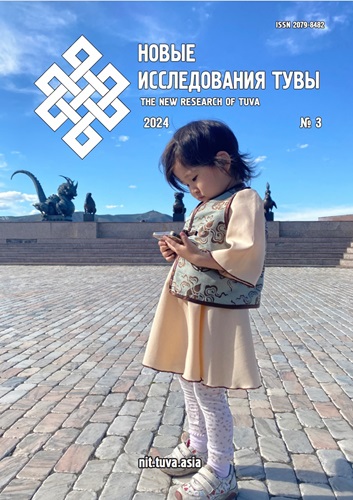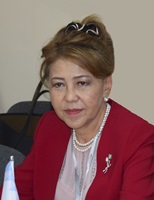The communicative and linguodidactic potential of epistolary texts: an applied aspect (based on the material of D. A. Mongush — A. S. Amanzholov's mail correspondence)
DOI:
https://doi.org/10.25178/nit.2024.3.14Keywords:
epistolary genre; epistolary text; linguodidactic potential; communicative situation; bilingual personality; Russian language; Russian-language text; Tuvan language; Tuvan studies; Dorug-ool Aldyn-oolovich Mongush; Altai Sarsenovich Amanzholov; letterAbstract
The article analyzes the communicative potential of epistolary texts and their prospects for linguodidactics — Russian and Kazakh. The material consists of fragments of private correspondence (1957–1984) by the Tuvan scholar — philologist D. A. Mongush addressed to his Kazakh colleague A. S. Amanzholov.
The contents of seven documents are presented in detail, including two letters, four postcards with descriptions of envelopes and front and back sides, and one telegram. These texts are being introduced to scientific circulation for the first time.
The article also substantiates the concept of an “elite bilingual personality” and argues in favor of classifying their Russian-language texts as authentic. It rationalizes the approach to teaching Russian language and training future teachers of Russian in the bilingual Kazakh-Russian communicative bilingual situation of Kazakhstan, as it does not disregard the traditional approach but expands linguistic and didactic tools.
A. Mongush's letters to A. S. Amanzholov can be used as examples of the epistolary genre in practical school classes and for further research in university audiences. They can also help to expand previously unknown knowledge about the history of Turkology.
References
Akerov, T. A. (2017) Kangorai Kyrgyz (The orthography and comparison of “Khyagas” and “Kyrgyz” ethnonyms). Bulletin of South Ural State University. Series “Social Sciences and the Humanities”, vol. 17, no. 1, pp. 6–12. (In Russ.). DOI: http://dx.doi.org/10.14529/ssh170101
Amanzholov, A. S. (2003) The history and theory of ancient Turkic writing. Almaty, ZAO «Izdatel'stvo “Mektep”». 368 p. (In Russ.).
Bakhtin, M. M. (1996) Collected works: in 7 vol. Moscow, Russkie slovari. Vol. 5. Works of the 1940s — early 1960s. 731 p. (In Russ.).
Bakhtikireeva, U. M. (2013) In memory of the Kazakh scientist-Turkologist A. S. Amanzholov. Vestnik Rossiiskogo universiteta druzhby narodov, seriia Teoriia iazyka. Semiotika. Semantika, no. 1, pp. 117–119. (In Russ.).
Bagramiants, N. L. (2013) A linguodidactic approach to the formation of linguistic competence. Izvestiia MGTU «MAMI», no. 4 (18), vol. 2, pp. 245–251. (In Russ.).
Belikov, V. I. and Krysin, L. P. (2001) Sociolinguistics. Moscow, Russian State University. 317 p. (In Russ.).
Bicheldei, U. P. (2023) Yuri Luduzhapovich Aranchyn: a man and a scientist who was ahead of his time. Ermolaevskie chteniia, pp. 21–31. (In Russ.). DOI: http://dx.doi.org/10.24412/2686-9624-2023-21-31
Gerasimov, G. I. (2018) Historical time. Filosofiia i kul'tura, no. 4, pp. 28–38. (In Russ.).
Dai Fan' (2015) Writing, sharing experiences and personal growth: a course in creative writing at a university in mainland China. Vestnik RUDN. Seriia Voprosy obrazovaniia: iazyki i spetsial'nost', no. 3, pp. 35–47. (In Russ.).
Demidov, A. B. (1999) Phenomena of human existence. Minsk, Ekonompress. 180 p. (In Russ.).
Zalevskaia, A. A. (2005) Psycholinguistic research. Word. Text: Selected works. Moscow, Gnozis. 543 p. (In Russ.).
Zalevskaia, A. A. (2009) Speech error as a tool of scientific research. Voprosy psikholingvistiki, no. 9, pp. 6–22. (In Russ.).
Zalevskaia, A. A. (2016) Psycholinguistic problems of semiosis. Voprosy psikholingvistiki, no. 3 (29), pp. 93–103. (In Russ.).
Kniazeva, Zh. (2021) From the contributing editor. In: New documents on the history of art studies. Issue 3. Monuments of the epistolary genre: tasks and prospects of research / ed. by Zh. V. Kniazeva. St. Petersburg, ID «Petropolis». 588 p. Pp. 9–14. (In Russ.).
Koroleva, I. A. (2017) Linguistic and cultural analysis of A.T. Tvardovsky's letters to A.V. Makedonov (based on the materials of Margarita Thompson's personal archive, donated to the Literary Museum of Smolensk State University). Russkaia filologiia: Uchenye zapiski Smolenskogo gosudarstvennogo universiteta, no. 17, pp. 170–177. (In Russ.).
Mongush, D. A. (1963) Forms of the past tense of the indicative mood in the Tuvan language. Kyzyl, Tuvan Book Publishing House. 167 p. (In Russ.).
Samdan, Z. B. (2019) Ulug odagnyng chyryynga… (ertemden bashkyvys D. A. Mongushtung 90 khar oiunga). In: Uchenye zapiski. Issue XXV / ed. by B. A. Dongak. Kyzyl, Tipografiia MBOU KTsO «Anyiak». 452 p. Pp. 376–388. (In Russ.).
Sereedar, N. Ch. (2010) Mongush Dorug-ool Aldyn-oolovich is a teacher, scientist, researcher of the Tuvan language. In: Uchenye zapiski. Issue XXII. Kyzyl. Pp. 439–444. (In Russ.).
Simchit, K.-M. A. (2012) The second volume of the Dorug-oola Mongusha dictionary. New Research of Tuva, no. 1, pp. 177–178. (In Russ.).
Tkachenko, S. O. (2020) A postcard in the communicative space of the Soviet era. Kul'tura i tsivilizatsiia, vol. 10, no. 3–1, pp. 254–263. (In Russ.).
Khol'me, T. (2021) What is correspondence? Pages of the epistolary heritage of Knud Jeppesen. In: New documents on the history of art studies. Issue 3. Monuments of the epistolary genre: tasks and prospects of research / ed. by Zh. V. Kniazeva. St. Petersburg, ID «Petropolis». 588 p. Pp. 21–61. (In Russ.).
Fesenko, O. P. (2008) Epistolary: genre, style, discourse. Vestnik Cheliabinskogo gosudarstvennogo universiteta, no. 23, pp. 132–143. (In Russ.).
Shapovalov, M. S. (2018) The story of one telegram: Palestine, the Fashoda crisis and Kaiser Wilhelm II. Vestnik arkhivista, no. 2, pp. 443–454. (In Russ.).
Published
How to Cite
For citation:
Amanzholova J. B., Iskendir A. A. and Shaimerdenova N. Zh. The communicative and linguodidactic potential of epistolary texts: an applied aspect (based on the material of D. A. Mongush — A. S. Amanzholov’s mail correspondence). New Research of Tuva, 2024, no. 3, pp. 240-264 (In Russ.). DOI: https://doi.org/10.25178/nit.2024.3.14
Issue
Section

This work is licensed under a Creative Commons Attribution-NonCommercial 4.0 International License.

Author(s) license holder(s) grant rights for their work to the journal (grantee of a license) under the simple non-exclusive open license in accordance with Art. 1286.1 «Open license for a research work, work of literature or fine arts», Civil Code of the Russian Federation.
New Research of Tuva publishes articles under the Creative Commons Attribution-NonCommercial license (CC BY-NC).
Since it is an open license, author(s) reserve the right to upload the article to their institutional repository, submit it to another journal (if it allows republications), or republish it on their own website (in full, or in part).
However, several conditions apply here:
a) The republished version must always contain the name(s) and affiliation(s) of the author(s), the original title and the hyperlink to the original version on the New Research of Tuva website;
b) It must be in open access, free of charge, and no category of readers must be in any way whatsoever advantaged over general readership.
c) should the contribution be submitted elsewhere by its author(s) without substantial modification (30% or more of original text unchanged), the body of the article should contain a disclaimer that the original version was published in New Research of Tuva (with a link to the respective page)
The CC-BY-NC is a non-revocable license which applies worldwide and lasts for the duration of the work’s copyright.











